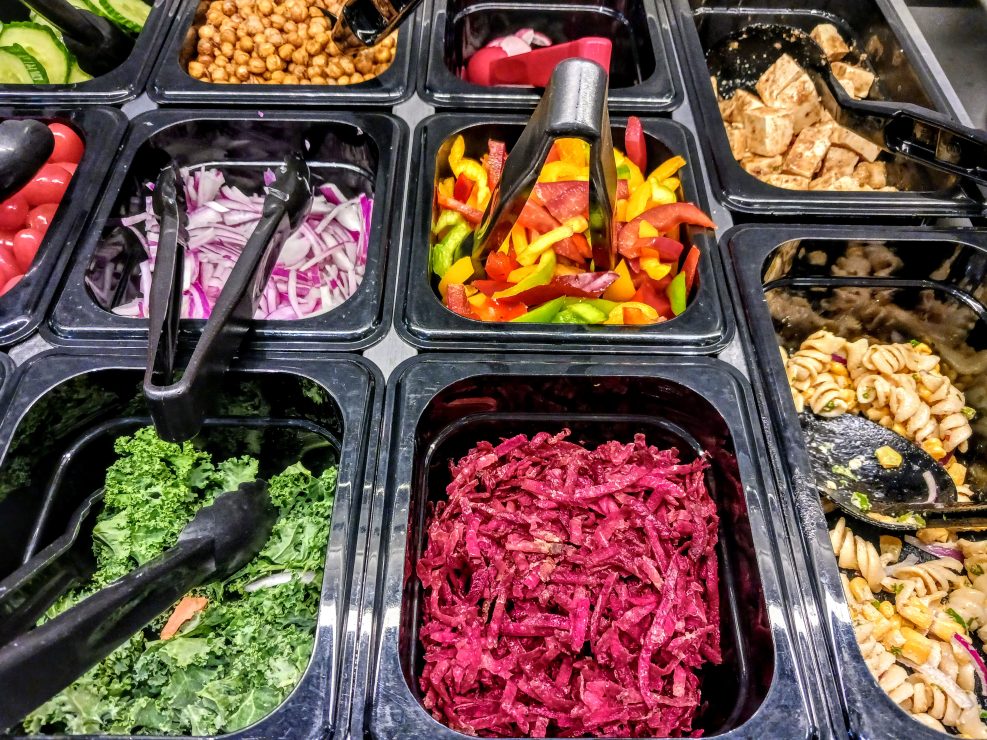Changes are coming to the Cove dining experience as students wave goodbye to Meatless Mondays and call for affordable options

Photo by Sarah Roberts.
No more Meatless Mondays. University Food Services (UNFS) have abandoned the scheme after almost 200 complaints about the initiative in their annual qualitative survey. UNFS published preliminary findings on April 4, gathering feedback from almost 3 000 respondents who rated their campus dining experiences.
In the results, UNFS recognized the demand for “high-quality, healthy and affordable food.”
In late 2022, the Government of Canada reported that food prices were increasing at their fastest pace in four decades, putting financial pressure on consumers as they struggled to keep up. The Martlet spoke to several students at the Cove, who reflected this anxiety.
“A lot of my friends are athletes, so they need a lot of food to keep them going every day,” said Sammie, a first-year undeclared engineering major. “Knowing that they can’t even have two full meals a day on their meal plan, I feel bad for them.”
Kyle, another first-year engineering student, also said affordability was an issue. “I’d say that’s definitely something I’m worried about. I’m especially concerned with how you can’t add any money onto your meal plan. You can only add it in flex funds, and those only get you [five] per cent off, compared to 50 per cent off.”
Residence and meal plan rates will also increase by roughly 10 per cent in the 2023-24 budget.
In an email to the Martlet, a spokesperson for UVic said, “Unfortunately, supply shortages, rising energy costs and other external factors have caused significant inflation in Canada, and the university is not immune to these pressures. The soaring cost of food, supplies, labour and energy means that delivering quality ancillary operations, such as food services, is getting more and more expensive.”
The spokesperson also highlighted several measures taken to ease the financial burden on students, including a $60 000 bursary program for residents on meal plans, over 100 Work-Study positions available through Residence Services and UNFS, and The Family Centre Community Food Market Program. They added, “We’ll continue to invest in programs that directly support food security for students, including the Meal Share Program and a new value menu that consists of lower-priced food options like pasta and soup.”
Perhaps the most significant menu adjustment is the suspension of Meatless Mondays, a weekly meat-free menu that responded to calls for climate action.
“We started ordering out as soon as we found out there’s meatless Mondays,” Ayvan, a first-year in linguistics, said.“If they had offered a different selection on Mondays, such as a better quality of vegetarian options, I’d be more inclined to come back.”
Liv, in social and political science, said that she “really respects the initiative,” but that many of her friends hated it.
Chloe, a second-year chemistry major, thought that some of the complaints missed the bigger picture of sustainability. However, she said, “People feel kind of upset that this is a choice that’s being taken away from them.”
The initiative will return as an opt-in in September 2023.
Another welcomed change is the addition of pasta to daily menus, with a permanent pasta station expected in the future.
Carter, a student in first-year engineering, said, “I think everyone has enjoyed the pasta, it’s usually pretty lined up. It’s another thing that’s easy for them to do and is [sort of] universally liked.”
UVic said that feedback on food options was mixed, with concerns raised around quality and variety. However, the initial results made no mention of food safety.
Liv said that she hadn’t encountered any severe issues, but has found hair in her food before. Chloe said that last year, a friend found a piece of plastic in their breakfast pancakes. Both said they knew of students who had posted experiences on social media. Some of the online allegations include insects found in food or undercooked meat
A spokesperson said that UVic was aware of the comments being posted on social media.
“We strongly encourage anyone who has a concern regarding their food or experience to speak with a food supervisor right away so we can refund them for their meal on the spot, ensure they can find another meal, and alert our culinary teams about a potential issue.”
They also highlighted that all of UVic’s services follow extremely high provincial safety standards. Routine inspection reports can be found on the Island Health website, the most recent of which rates Čeqʷəŋín ʔéʔləŋ, formerly known as Building One, as low risk.
In the coming weeks, the UNFS will share plans with the UVSS and GSS, and a comprehensive review of findings will be published online in mid-May.
The spokesperson added, “We are planning to hold an open house when our action plan is ready this Fall. We will publicize this event widely and encourage everyone to attend.”
In the meantime, diners can also email eat@uvic.ca with feedback.







